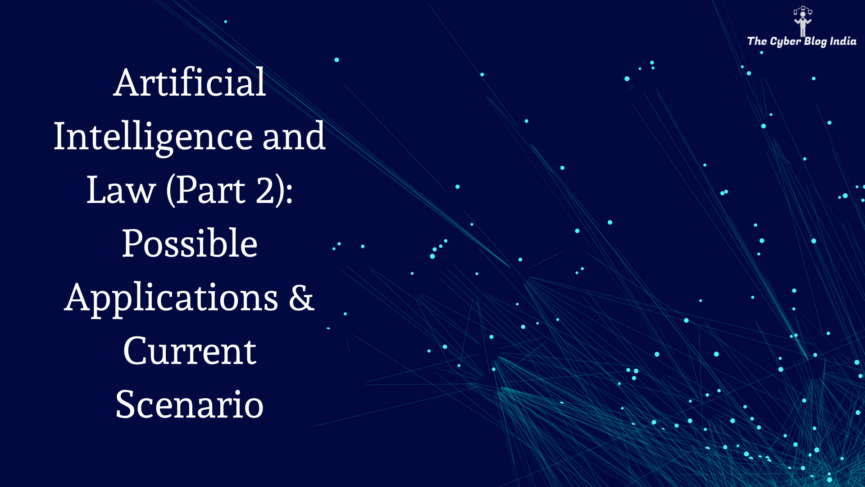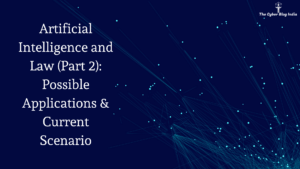Artificial Intelligence and Law (Part 2): Possible Applications & Current Scenario


Artificial Intelligence and Law (Part 2): Possible Applications & Current Scenario
This second part of the series on Artificial Intelligence and Law focusses on the role of AI in a lawyer’s life. It seeks to address how AI can be beneficial to a legal practitioner. The first part presented an introductory discussion on Artificial Intelligence. In case you missed it, you can check it here.
(This is a three-part series on Artificial Intelligence and Law. You are currently reading the second part. Links to other parts are available at the bottom of this article.)
For a lawyer or legal professional, legal research and contract review will be the simplest of use cases for an AI-based system. AI can assist efficiently in performing repetitive tasks. For maximum utilisation of AI-based system, a legal professional must have good judgement, analytical skills, research skills, understanding of due diligence, and good communication skills. On the other hand, some of the essential characteristics needed in AI-based systems to assist legal professionals are:
- Capacity to predict and adapt
- Capacity to be reactive
- Making decisions on its own
- Capability to move and perceive
- Capability to analyse data quickly
- Automating repetitive tasks
If an AI-based system possesses such qualities, a legal professional can utilise their time on important tasks. Based on my research, I have identified three areas where AI-based systems are (or will be) useful for legal professionals.
1. Contract Review
For corporate transactions, contracts are the lifeblood. Manual review of contracts takes a substantial amount of time, while an AI-based system may give its results in a few minutes. Lawgeex, Klarity, Clearlaw, and LexCheck are on the frontlines to provide AI-based contract review services.
2. Early Case Assessment
Once a plaint is submitted before a court of law, the next step is to reply to the written statement submitted by the defendant. Using predictive analysis, law firms and legal professionals can make informed decisions by understanding possible defences that may be put forth. Case assessment can also help in finding the relevant precedents for a set of facts. Blue J Legal is one such AI prediction engine that claims to find relevant case laws from facts. A couple of recent studies have been able to achieve an accuracy of 70% and 79% for finding relevant cases from the US Supreme Court and the European Court of Human Rights, respectively.
3. Legal Research
A legal research activity may take days to get completed. A legal professional needs to go through articles, books, case laws, briefs, acts, amendments, rules and guidelines, online sources, etc. While most of these sources have been digitalised, one still needs to filter through the search results to find the required cases or laws. AI-based solutions such as ROSS Intelligence provide question-based search, document analyser, and case overviews to simplify the overall legal research process.
What are we doing about the adoption of AI in Indian legal practice?
AI is yet to be predominantly adopted by the legal professionals in India. With the push for digitalisation of court records and processes, it is expected that we will see increased adoption in the legal fraternity over the next decade. In 2017, Cyril Amarchand Mangaldas became the first Indian law firm to adopt Kira Systems to use AI in their day-to-day legal practice.
IIT Kharagpur researchers have also developed an AI-based program to analyse judgements and advice laymen about laws being violated in any given situation. Further, this program also predicts if it would be useful to take the matter to court and legal costs will be minimised as a result. Another AI-based solution that deserves mention is MikeLegal. Based out of India, this solution aims to streamline how lawyers research. As of now, it focusses on intellectual property law.
Ending Notes
Adoption of AI by the Indian legal community is still at its nascent stages. However, we will see many more startups focussing on providing quality AI-based legal services for legal professionals. Instead of looking at AI-based systems as a replacement of human beings, one should look at AI as a tool to help deal with tedious tasks in a cost-effective manner. While AI systems have a fair share of advantages, they are also accompanied by a good deal of disadvantages. These disadvantages are covered in the third part of this series.
Read the third and first parts of this series:
- Artificial Intelligence and Law (Part 3): Possible Legal Issues
- Artificial Intelligence and Law (Part 1): Introduction and Definition
This article has been written by Akhil Mishra. He is currently an undergraduate student at Amity Law School, Delhi.
Disclaimer: Views or opinions expressed in this article, whether impliedly or explicitly, are personal.
Edited by Raj Pagariya
Featured Image Credits: Background vector created by starline – www.freepik.com
